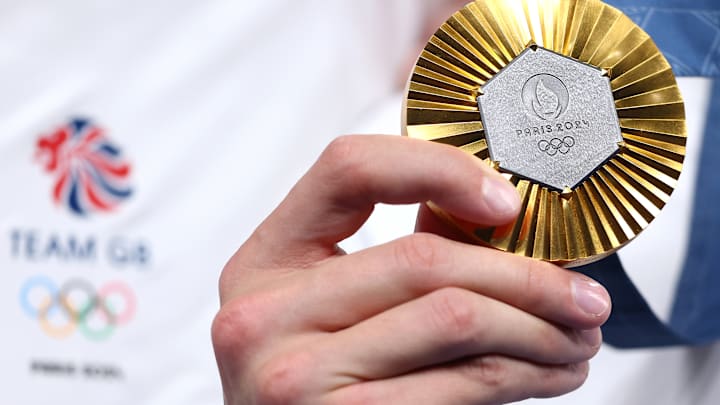The prizes awarded at the Olympics have varied over their long history. Ancient Greek competitors were given an olive branch from a wild olive tree that grew at Olympia (and some money upon returning home a champion, too). When the first modern Olympic Games organized by the International Olympic Committee were held in 1896 in Athens, winners got a silver medal and an olive branch, and runners-up received a bronze medal and a laurel branch.
At the 1900 Paris Games, some athletes got silver or bronze medals, but the majority received cups or other trophies. Gold medals made from solid gold were introduced at the 1904 St. Louis Games, and the first time medals were awarded to the top three placing athletes in the gold-silver-bronze order was four years later in London.
The 1912 Stockholm Games were the last time solid gold medals were awarded. These days, Olympic rules allow gold medals to be made mostly of .925-grade (a.k.a. sterling) silver coated in 6 grams of 24-karat gold. The second place silver medals must contain silver of a similar grade. Beyond that, the specific composition of the medals, and their design, is largely left to the host city’s organizing committee.
Going for (1 Percent) Gold
For this year’s Paris Games, the gold medals are made of 523 grams of silver gilded with six grams of pure gold. The silver medals contain 525 grams of silver, and the bronze medals are an alloy of copper, tin and zinc.
The medals have a value beyond the worth of their precious metal content, though. They’re pieces of history, and can command high asking prices on the market. First-place silver medals from the first modern Games in 1896 in Athens have sold at auction for $180,000 and $112,000 in the past few years. Medals won by famous athletes go for much more. In 2013, one of the four gold medals won by track and field star Jesse Owens at the 1936 Berlin Games was auction for nearly $1.5 million.
Ultimately, the gold, silver, and bronze are worth much more than their metallic contents. A story from ancient Greece, back when athletes received only a humble olive branch, says a lot about what these prizes mean. In The Histories, Herodotus writes about a group of Arcadian deserters who went to Persia looking for work. The Persians asked them what the Greeks were up to, and the Arcadians explained that their countrymen were “holding the Olympic festival and viewing sports and horse races.” The Persians asked what prizes were offered to the competitors and the Arcadians explained that the victors received a “crown of olive.”
“Then Tigranes son of Artabanus [a Persian regent] uttered a most noble saying,” writes Herodotus. “When he heard that the prize was not money but a crown, he could not hold his peace, but cried, ‘Good heavens, Mardonius [a Persian military commander], what kind of men are these that you have pitted us against? It is not for money they contend but for glory of achievement!’”
Read More Facts About the Olympics:
A version of this story was published in 2012; it has been updated for 2024.
